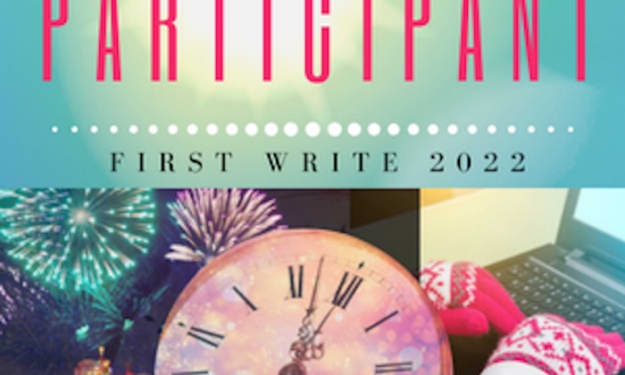7 Writing Muses Hiding in Plain Sight
Finding inspiration is as easy as petting your dog

I don't want to write today. I really don't.
I want to make jewelry. I want to read a book. I want to contemplate my navel. I want to rewatch a hilarious YouTube video I found with Craig Ferguson and Robin Williams engaged in a lightning round of irreverent banter. I want to laugh.
Instead, I call my mother and we chat about our health and the high cost of prescription drugs. After I hang up, I want to become an activist. I want to start a petition, sign a petition, and protest.
Call it procrastination or writer's block, the fact is I need a muse.
Have you ever sat at your writing desk, staring out the window or down at a blank page, just trying to think of something - anything - to write?
Having writer's block is like being kidnapped by a dastardly villain who ties you to the railroad tracks. You may kick and scream in desperation but all you hear is the evil cackling from this horrible, mustached cad who is preventing you from accomplishing your dreams.
Fortunately, I know all is not lost because I've discovered seven potential muses hiding in plain sight to help you write that novel or screenplay:
1. Pets
Have you heard of xenofiction? These are books written from an animal's perspective, like The Art of Racing in the Rain by Garth Stein. We are fascinated by our pets. We wonder what they're really thinking about their lives and particularly what they think about us.
One of our cats, Holly, is quite the talker. She talks when she sees us, when we serve her meals, and each time she uses her litter box. And whenever we ask her a question, she replies with a one word answer that sounds a lot like "Meh!" Holly thinks she's the queen of everything and so I've "honored" Her Majesty with a cameo appearance in my forthcoming book, Moonwater Beach. I doubt she'll be impressed, though.
Something to muse about: Study your pet. What texture is your dog's fur? How many colors are in your parakeet's feathers? Do your pets snore when they sleep? How do your pets show joy or fear? How do they interact with other species? How do they react when they are frightened? How can you incorporate your pet into a story?
2. Photo Album/School Yearbook
Oh, the places you've been, the people you've known! Well, you've had quite the life, haven't you? Luckily, some of your favorite memories (and potential stories) are preserved within the timeworn pages of your old photo album or school yearbook.
I remember looking through my mother's old high school yearbook and giggling when I found this message scrawled by one of her friends:
Mary had a little lamb
she tied it to a heater
and everytime it turned around
it burned its little seater!
I have no idea how I'm able to remember that long-ago poem because I can't even recall why I just walked into the kitchen. Anyway, the message stuck and perhaps you might find a message in your own yearbook that sparks an idea or two. (But be merciful to the lambs, poor dears.)
Something to muse about: As you flip through the pages, look closely at the faces and places. Any of them inspire you? Which family "secrets" would make an intriguing story? Remember that funny guy from English class? How did he turn out? See your grandmother holding you as an infant? Imagine her thoughts when that photo was taken.
3. Musical Instruments
Since the days of ancient Greece, many a songwriter has picked up a guitar or lute to lament a lost love or sing praise to the Creator or king. Songs remind us of another time, another place. We hear a song and instantly recall where we were, who we were with, and whether it was a good or unpleasant experience.
While I grew up playing the piano, accordion, autoharp, guitar, clarinet, and snare drums, I never fantasized about being a professional musician, but I know some writers do. Can you imagine Mitch Albom sitting at your piano? And what if he invited famous author pals like Stephen King, Amy Tan, Dave Barry, Scott Turow, and Barbara Kingsolver to join him on their instruments of choice? How exciting your life would be to have so many literary greats jamming in your living room! But wait - would you believe there really is a band like that? Enjoy the "hard listening" sounds of the Rock Bottom Remainders!
Something to muse about: How long have you owned your instrument? What were your emotions when you received it? How and where was it built? Do you give it special treatment? Does it sound sweet, tinny or primal? What was the first song you ever played? Do you have an idea for a story about a songwriter?
4. Television
The comedian Groucho Marx once said: "I find television very educating. Every time somebody turns on the set, I go into the other room and read a book."
All kidding aside, "the boob tube" offers a wellspring of ideas for plots and character development. Khaled Hosseini found inspiration for The Kite Runner after watching a documentary about the Taliban that banned kite flying. Suzanne Collins wrote The Hunger Games after channel-surfing from TV reality shows to war coverage on the news.
Something to muse about: Watch a news report or documentary. What are the interviewees saying? Do you believe them? Do you feel empathy? What is really going on behind the scenes? Can you apply their situation to one of your stories?
5. Hobby Collection
In one of my works-in-progress, my protagonist works part-time in a dollhouse shop. Not so coincidentally, I've been creating and collecting miniatures and dollhouses for years, so researching this hobby is child's play.
Since readers often relate more to a story when they share a hobby with a character, take a look at your collection. Do you have a passion for stamps? Coins? Dolls or comic books? Can you write a fascinating story about a fellow collector of antique perfume bottles or door knobs?
Something to muse about: Take what you know of your hobby and apply it to your writing. For example, what if your protagonist discovered a rare stamp that set them on a worldwide adventure? What if your character is so obsessed with collecting that he is diagnosed with hoarding disorder? How does that affect his relationships? How would that affect his ability as a private detective?
6. Your Body
It's not easy looking into a mirror and telling your reflection "I love you," even if self help guru Louise Hay tells you it's your path towards healing.
Most of us are critical of our bodies, so it stands to reason that our fictional characters might be, too. Jot down all the things you don't like about your body and apply them as character traits. For instance, I've never liked my big ol' "Flintstone" feet. They're wide and long and they stick out like flippers. But what if I gave my antagonist those same feet? How would he cope?
Something to muse about: What do you see in your wrinkles and scars? Are they memories of pain or triumphs? How would your character feel if she had been born with no arms? Apply these observations to your writing!
7. The Kitchen
Let's say you're intent on penning a fish-out-of-water scene for your extremely spoiled protagonist, so you want her to bake a cake. Do you know the process?
First, take a look inside your refrigerator. Notice the ingredients that you would use to bake a cake, like eggs and butter. What else do you see? Is there moldy cheese in there? Green broccoli turning yellow? Crusty ketchup around the bottle cap? Could you create something beautiful from the leftovers or is your refrigerator full of stuff that nightmares are made from? Write about what you find there and save it in your "Ideas" folder because you never know when you'll want to write about the inside of a refrigerator.
Something to muse about: Get out your cake recipe because you're really going to bake that cake! Take out the equipment - the mixer, bowl, spoons, and measuring cups - and write about how they look and feel. Make the batter. Taste the batter. Does it need more sugar? Less sugar? More vanilla?
Once you've completed your baking research, you can write a more realistic situation for your character, including how to deal with that messy kitchen afterwards!
About the Creator
Eleyne-Mari Sharp
Author/Visionary/Muse committed to Peace and Planetary Healing at writelighter.com.
Reader insights
Nice work
Very well written. Keep up the good work!
Top insights
Compelling and original writing
Creative use of language & vocab
Easy to read and follow
Well-structured & engaging content
Excellent storytelling
Original narrative & well developed characters
Eye opening
Niche topic & fresh perspectives
Heartfelt and relatable
The story invoked strong personal emotions
Masterful proofreading
Zero grammar & spelling mistakes
On-point and relevant
Writing reflected the title & theme






Comments
There are no comments for this story
Be the first to respond and start the conversation.